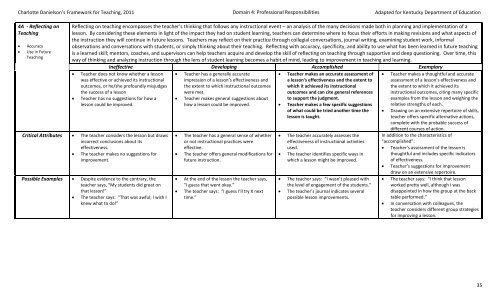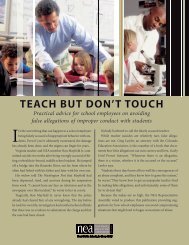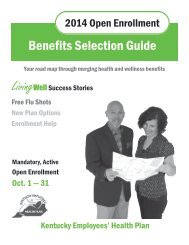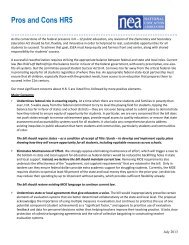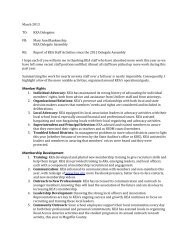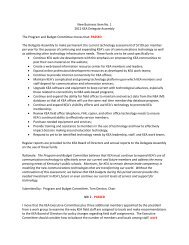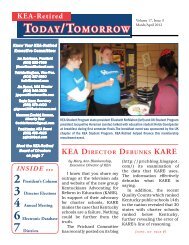Kentucky Adapted Danielson 2011 Framework - Kentucky Education ...
Kentucky Adapted Danielson 2011 Framework - Kentucky Education ...
Kentucky Adapted Danielson 2011 Framework - Kentucky Education ...
Create successful ePaper yourself
Turn your PDF publications into a flip-book with our unique Google optimized e-Paper software.
Charlotte <strong>Danielson</strong>’s <strong>Framework</strong> for Teaching, <strong>2011</strong><br />
Domain 4: Professional Responsibilities<br />
<strong>Adapted</strong> for <strong>Kentucky</strong> Department of <strong>Education</strong><br />
4A - Reflecting on<br />
Teaching<br />
<br />
<br />
Accuracy<br />
Use in Future<br />
Teaching<br />
Reflecting on teaching encompasses the teacher’s thinking that follows any instructional event – an analysis of the many decisions made both in planning and implementation of a<br />
lesson. By considering these elements in light of the impact they had on student learning, teachers can determine where to focus their efforts in making revisions and what aspects of<br />
the instruction they will continue in future lessons. Teachers may reflect on their practice through collegial conversations, journal writing, examining student work, informal<br />
observations and conversations with students, or simply thinking about their teaching. Reflecting with accuracy, specificity, and ability to use what has been learned in future teaching<br />
is a learned skill; mentors, coaches, and supervisors can help teachers acquire and develop the skill of reflecting on teaching through supportive and deep questioning. Over time, this<br />
way of thinking and analyzing instruction through the lens of student learning becomes a habit of mind, leading to improvement in teaching and learning.<br />
Ineffective Developing Accomplished Exemplary<br />
<br />
<br />
Teacher does not know whether a lesson<br />
was effective or achieved its instructional<br />
outcomes, or he/she profoundly misjudges<br />
the success of a lesson<br />
Teacher has no suggestions for how a<br />
lesson could be improved.<br />
Critical Attributes The teacher considers the lesson but draws<br />
incorrect conclusions about its<br />
effectiveness.<br />
The teacher makes no suggestions for<br />
improvement.<br />
Possible Examples Despite evidence to the contrary, the<br />
teacher says, “My students did great on<br />
that lesson!”<br />
The teacher says: “That was awful; I wish I<br />
knew what to do!”<br />
<br />
<br />
<br />
<br />
<br />
<br />
Teacher has a generally accurate<br />
impression of a lesson’s effectiveness and<br />
the extent to which instructional outcomes<br />
were met.<br />
Teacher makes general suggestions about<br />
how a lesson could be improved.<br />
The teacher has a general sense of whether<br />
or not instructional practices were<br />
effective.<br />
The teacher offers general modifications for<br />
future instruction.<br />
At the end of the lesson the teacher says,<br />
“I guess that went okay.”<br />
The teacher says: “I guess I’ll try X next<br />
time.”<br />
<br />
<br />
<br />
<br />
<br />
<br />
Teacher makes an accurate assessment of<br />
a lesson’s effectiveness and the extent to<br />
which it achieved its instructional<br />
outcomes and can cite general references<br />
to support the judgment.<br />
Teacher makes a few specific suggestions<br />
of what could be tried another time the<br />
lesson is taught.<br />
The teacher accurately assesses the<br />
effectiveness of instructional activities<br />
used.<br />
The teacher identifies specific ways in<br />
which a lesson might be improved.<br />
The teacher says: “I wasn’t pleased with<br />
the level of engagement of the students.”<br />
The teacher’s journal indicates several<br />
possible lesson improvements.<br />
Teacher makes a thoughtful and accurate<br />
assessment of a lesson’s effectiveness and<br />
the extent to which it achieved its<br />
instructional outcomes, citing many specific<br />
examples from the lesson and weighing the<br />
relative strengths of each.<br />
Drawing on an extensive repertoire of skills,<br />
teacher offers specific alternative actions,<br />
complete with the probable success of<br />
different courses of action.<br />
In addition to the characteristics of<br />
“accomplished”:<br />
Teacher’s assessment of the lesson is<br />
thoughtful and includes specific indicators<br />
of effectiveness.<br />
Teacher’s suggestions for improvement<br />
draw on an extensive repertoire.<br />
The teacher says: “I think that lesson<br />
worked pretty well, although I was<br />
disappointed in how the group at the back<br />
table performed.”<br />
In conversation with colleagues, the<br />
teacher considers different group strategies<br />
for improving a lesson.<br />
35


